Provide us with your details and one of our insurance experts will contact you to discuss your requirements










Page written by Chris Godfrey. Last reviewed on May 22, 2025. Next review due April 1, 2026.

No business is without risk and calamity can strike at any time, exposing your organisation to the potential of significant cost, even the possibility of closure. Limited company insurance is designed to eliminate the risk of catastrophe, protecting you, your employees, your customers, members of the public, and everything your business owns or uses should the worst thing ever happen.
Limited company insurance is an umbrella term for a range of insurances that can protect businesses from financial loss caused by accidents, omissions, errors, fire, flood and theft and more. Most companies will seek an insurance package that includes professional indemnity insurance, public liability insurance, and employers’ liability insurance, plus specialist polices that cover risks unique to their business or industry.
No. Only employers’ liability insurance is required by law. Other business insurances are optional, although some clients and organisations may require your organisation to have certain types of cover in place – such as public liability insurance – before they will trade with you.
Few Canadian SMEs could absorb the financial blow of a major fire or flood on their premises, a large public liability claim, loss of inventory, systemic cyber-attack, theft of expensive plant and machinery, or many other negative possibilities. In such circumstances, and without insurance protection, many businesses would be forced to close. Limited company insurance is therefore essential to ensure your business stays in business should disaster ever strike.
Limited company insurance can cover almost any type of risk, protecting your business from loss caused by accidents, errors, omissions, theft, loss, fire, flood and more. Typical cover includes protection from:
Because problems can come from any direction, most companies will protect themselves with an array of insurances, including:
Public liability insurance protects your business if someone is injured, or their property is damaged because of the services that you or your business provides. This type of cover, also known as PL or liability insurance, is designed to protect your business against third party claims for injuries or property damage from a customer or client, passer-by, or a visitor to your business premises – whether you’re at fault or not.
Employers’ Liability (EL) Insurance is a legal requirement for most Canadian employers. EL protects you and your employees, (including those who no longer work for you), should they be injured or become unwell as a result of working for your business. EL typically covers the associated legal and compensation costs, and other damages of such events, but it can also cover accidental injury or damages caused by an employee to a third party, like your customers.
Professional indemnity insurance, also known as professional liability insurance, is an essential type of cover for individuals and businesses that advise clients, help them navigate complex financial or legal affairs, or provide them with vital information that is published in the media. In these kind of cases, errors can cost thousands or even millions in legal compensation claims. Professional indemnity (PI) can protect you if a client makes a financial loss because of your work and then makes claim against you or your business. Trade associations, government bodies, public institutions, and major customers will often require proof of a minimum level of PI insurance before doing business with you.
Personal accident insurance covers anyone named on the policy for accidental injury or death at or outside of work. This typically includes loss of income, medical costs and hospitalisation benefits.
Business Contents Insurance covers the insured for the loss, damage, and theft of the contents of their business premises, including office equipment, stock and inventory.
Top tip: If you’re a landlord, contents cover will be your tenant’s responsibility. However, depending on the lease/rent agreement you may have supplied furniture or appliances that belong to you. In which case, Landlord’s Commercial Insurance can be used to protect your provided contents from loss, damage or theft caused by the tenant or a third party.
Tools Insurance, also known as portable equipment cover, or business equipment insurance, covers the cost of replacing business tools and equipment if they’re lost, damaged, or stolen. Items that are typically covered include:
Stock insurance, also known as inventory insurance, protects your work materials, such as piping and timber, and the items you are planning to sell – for example the contents of your shop – in the event they are stolen or damaged/destroyed by fire, flood or accident.
Any building that is occupied by a business is classed as commercial property. Shops, offices, pubs, salons, restaurants, showrooms, cinemas, and clinics are examples of commercial property.
Commercial property insurance, also known as building insurance, is designed to protect the owners of commercial buildings from a financial loss resulting from damage to or the total destruction of the property and/or whatever was inside.
Designed for tradespeople, owned plant insurance protects the specialist equipment you own and use in your business. For example:
This cover may also provide limited protection for loss of stock in trade, such as piping, flooring, electrical equipment and timber that you have purchased but not yet used to complete a project.
Hired-in plant insurance protects equipment that you may have hired and that is not covered by the lessor’s insurance. For example:
The legal costs involved in complex business disputes or large compensation claims can often run into the tens or even hundreds of thousands of pounds – sometimes costing more than the eventual financial award or penalty. Legal expenses insurance can cover the legal costs of litigation, arbitration, and expert legal advice connected to your company and the things you do or sell.
You need sufficient commercial property insurance to restore your buildings and contents to the state they were in before the damage or loss occurred. This means you should request a policy limit – the maximum sum that the insurer will pay out – to cover the cost of the worst-case scenario: Meaning the demolition and rebuilding of the property and replacing everything inside. If you are not sure what this value would be, you could employ a professional valuer to provide an estimate of total replacement cost.
Top tip: Don’t forget the hidden expenses incurred in any rebuild, it isn’t only demolition and construction costs you will face. Surveyors, legal and other professional fees, plus permits and local council inspection costs must be factored in.
The amount of limited insurance your company needs depends on the type and size of your business, plus, if you employ others, you will need a minimum of CAD $5 million employers liability insurance. To calculate the levels of cover and what type of policies you need, start with the basics. For example what would it cost to replace your…
Then you should think about the type of work your company does, the size of your sales and contracts, and the potential claims you could face from clients, consumers, and suppliers if anything were to go wrong. You should also check with your professional body or industry regulator, as they may set a minimum level of insurance you must carry.
Lastly, you must also consider what it would cost you to keep operating in the event of a crisis. For example, if your premises were destroyed in a fire, how much would it cost to secure temporary accommodation and how much would it cost to get back up to speed? Could you afford to pay your employees in the interim? Could you afford to pay yourself?
Some policies can cost as little as CAD $4 per month, but premiums will vary depending on your business type, the industry you work in and the excess you agree to pay.
All business involves risk, but that doesn’t mean you have to suffer the consequences if things go wrong. Don’t gamble with your organisation’s future. Contact Swoop today to compare top-quality limited company insurance and to discuss all your business insurance needs.
Chris is a freelance copywriter and content creator. He has been active in the marketing, advertising, and publishing industries for more than twenty-five years. Writing for Barclays Bank, Metro Bank, Wells Fargo, ABN Amro, Quidco, Legal and General, Inshur Zego, AIG, Met Life, State Farm, Direct Line, insurers and pension funds, his words have appeared online and in print to inform, entertain and explain the complex world of consumer and business finance and insurance.
Swoop promise
At Swoop we want to make it easy for SMEs to understand the sometimes overwhelming world of business finance and insurance. Our goal is simple – to distill complex topics, unravel jargon, offer transparent and impartial information, and empower businesses to make smart financial decisions with confidence.
Find out more about Swoop’s editorial principles by reading our editorial policy.
Related pages
Get your free Limited company insurance quote today
Join the 95,000+ businesses just like yours getting the Swoop newsletter.
Free. No spam. Opt out whenever you like.
Kingfisher Way, Silverlink Business Park, Newcastle upon Tyne, NE28 9NX, UK
View in Google MapsAberystwyth Innovation and Enterprise Campus
Gogerddan Campus
Aberystwyth University
Ceredigion
SY23 3EE
Dogpatch Labs, The CHQ Building, Custom House Quay, Dublin, Ireland
View in Google MapsSuite 801, Level 8, 84 Pitt Street, Sydney, NSW 2000, Australia
View in Google Maps43 W 23rd St, New York, NY 10010, United States
View in Google Maps21 Dreyer Street, Cape Town, South Africa, 7708
View in Google MapsClever finance tips and the latest news
Delivered to your inbox monthly
Join the 95,000+ businesses just like yours getting the Swoop newsletter. Free. No spam. Opt out whenever you like.




